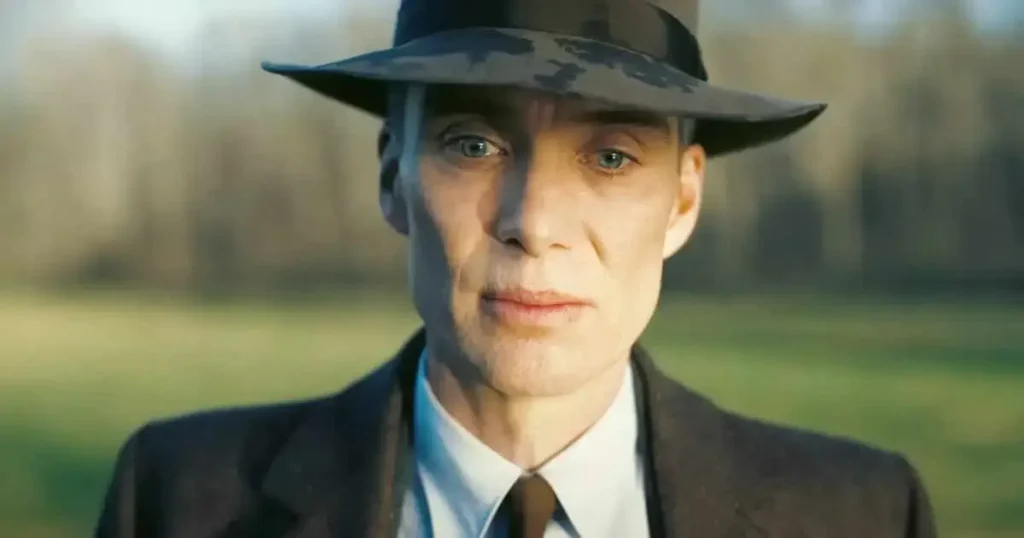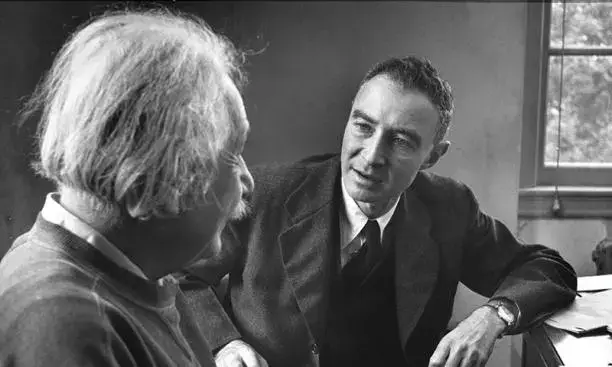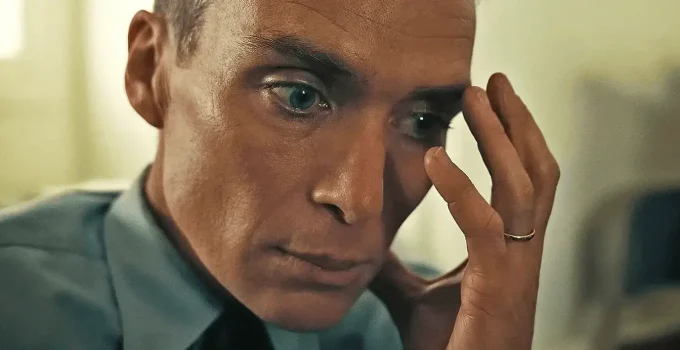Christopher Nolan, known for his exceptional storytelling abilities, has consistently pushed the boundaries of cinema with his unique vision. With each project, he immerses audiences in a world that is both thrilling and thought-provoking. In “Oppenheimer,” Nolan’s latest masterpiece, he takes on the daunting task of exploring the life and work of J. Robert Oppenheimer, the brilliant mind behind the creation of the atomic bomb.
Nolan’s storytelling approach is characterized by a seamless blend of suspense, emotion, and intellectual intrigue. He has a knack for creating complex narratives that keep audiences on the edge of their seats while simultaneously challenging them to engage with profound philosophical questions. “Oppenheimer” is no exception. With meticulous attention to detail and a deep understanding of historical context, Nolan aims to transport viewers back to a critical moment in history and explore the moral and ethical dilemmas faced by Oppenheimer and his team.
Through his visionary storytelling techniques, Nolan invites us to reflect on the consequences of scientific advancements and the immense responsibility that comes with wielding such power. As we eagerly await the release of “Oppenheimer,” we can expect a cinematic experience that not only entertains but also sparks important conversations about our collective past and the implications for our future.

The Historical Context of the Atomic Architect
To fully appreciate Nolan’s take on J. Robert Oppenheimer, it is crucial to understand the historical context in which he operated. Oppenheimer played a pivotal role in the development of the atomic bomb during World War II. As part of the Manhattan Project, he led a team of brilliant scientists tasked with harnessing the power of nuclear energy.
Nolan’s commitment to historical accuracy is evident in his meticulous research and attention to detail. By immersing himself in the era, he aims to recreate the atmosphere of the time and shed light on the immense pressure faced by Oppenheimer and his team. Through “Oppenheimer,” Nolan offers us a glimpse into the complexities of wartime science and the moral dilemmas that arise when knowledge is weaponized.
This historical backdrop serves as the foundation for Nolan’s narrative, allowing him to explore the personal struggles and ethical conflicts faced by Oppenheimer. By grounding the story in reality, Nolan ensures that audiences not only witness the scientific breakthroughs but also grapple with the profound implications they had on humanity.
Oppenheimer’s Impact on Cinema
J. Robert Oppenheimer’s legacy extends beyond the realm of science and into the world of cinema. His role as the architect of the atomic bomb has been a subject of fascination for filmmakers for decades. However, Nolan’s take on Oppenheimer promises to be a groundbreaking exploration of the man behind the myth.
Cinema has always been a powerful medium for exploring complex characters and moral dilemmas, and Oppenheimer’s story is ripe with cinematic potential. Nolan, with his keen eye for visual storytelling, seeks to capture the essence of Oppenheimer’s character and the weight of his decisions on the big screen.
Through the medium of film, Nolan can delve into Oppenheimer’s innermost thoughts and emotions, taking audiences on a journey through his triumphs, doubts, and regrets. By humanizing Oppenheimer, Nolan not only adds depth to the narrative but also invites viewers to question their own values and beliefs.
Visual and Audio Techniques Used by Nolan
Nolan is renowned for his innovative use of visual and audio techniques to enhance the storytelling experience. From his mind-bending manipulation of time in “Inception” to the immersive war sequences in “Dunkirk,” he consistently pushes the boundaries of what is possible onscreen.
Audiences can expect to be treated to Nolan’s trademark visual flair. With meticulous attention to detail, he recreates the 1940s era, immersing viewers in the sights and sounds of the time. From the sprawling laboratories to the tension-filled war rooms, every frame is meticulously crafted to transport audiences back in time.
Nolan’s use of sound is equally impactful. Through a combination of atmospheric sound design and a haunting musical score, he heightens the emotional impact of key moments in the film. Whether it’s the rumbling of an explosion or the subtle notes of a piano, every sound is carefully chosen to evoke a visceral response from the audience.
The seamless integration of visual and audio techniques is a hallmark of Nolan’s filmmaking style. These techniques will undoubtedly play a crucial role in bringing the story to life and immersing audiences in the world of J. Robert Oppenheimer.
The Performances and Character Development in the Film
As with any Christopher Nolan film, the performances in situs slot online are expected to be nothing short of exceptional. Nolan has a knack for attracting top-tier talent, and “Oppenheimer” is no exception. With an ensemble cast of seasoned actors, the film promises to deliver performances that are both nuanced and emotionally resonant.
The character development in “Oppenheimer” is a key aspect of the film’s narrative. As the story unfolds, audiences will witness the transformation of J. Robert Oppenheimer from a brilliant scientist to a conflicted figure grappling with the consequences of his actions. Nolan’s skillful direction and the actors’ performances will undoubtedly breathe life into these characters, allowing viewers to empathize with their struggles and dilemmas.
The chemistry between the actors and their ability to convey complex emotions will be crucial in creating a compelling narrative. Nolan has a knack for extracting powerful performances from his cast, and “Oppenheimer” is poised to be no exception. As the characters navigate the moral and ethical minefield of the atomic bomb project, audiences will be captivated by their emotional journey and the profound impact it has on their lives.

The Reception and Critical Acclaim of Oppenheimer
Given Christopher Nolan’s reputation as a visionary filmmaker, it comes as no surprise that “Oppenheimer” has generated significant anticipation and excitement among film enthusiasts and critics alike. The combination of Nolan’s unique storytelling abilities and the intriguing subject matter of J. Robert Oppenheimer’s life has created a buzz that is difficult to ignore.
As with any highly anticipated film, the critical reception of “Oppenheimer” will undoubtedly be closely watched. Nolan’s previous works have consistently garnered critical acclaim, and expectations are high for his latest endeavor. The film’s ability to balance historical accuracy with compelling storytelling will be a key factor in its reception.
Moreover, the performances, visual style, and thematic depth of “Oppenheimer” will also be scrutinized. Nolan’s films often prompt deep analysis and discussion, and “Oppenheimer” is expected to be no different. Critics will undoubtedly explore the film’s exploration of moral and ethical dilemmas, its commentary on the consequences of scientific advancements, and its resonance with contemporary issues.
Exploring the Deeper Themes and Messages in the Film
While “Oppenheimer” is undoubtedly a captivating story in its own right, it also offers an opportunity to explore deeper themes and messages. Nolan’s films often tackle complex philosophical questions, and “Oppenheimer” is poised to be no exception.
One of the central themes of the film is the moral and ethical responsibility that comes with scientific discovery. Oppenheimer’s work on the atomic bomb raises profound questions about the role of scientists in society and the potential consequences of their actions. Nolan’s exploration of these themes invites viewers to reflect on the implications of scientific advancements and the weight of responsibility that accompanies them.
Another theme that is likely to be explored in “Oppenheimer” is the nature of power and its impact on individuals and society as a whole. The atomic bomb project was a demonstration of immense power, and Nolan’s film promises to delve into the psychological and emotional toll it took on Oppenheimer and those around him. Through the character’s journey, audiences will be prompted to consider the far-reaching effects of power and the choices individuals make when faced with it.
Comparisons to Other Films in Nolan’s Filmography
Nolan’s filmography is filled with critically acclaimed and commercially successful works that have left a lasting impact on the world of cinema. “Oppenheimer” is expected to be yet another addition to this impressive body of work, but how does it compare to his previous films?
While each Nolan film is unique in its own right, there are certain thematic and stylistic elements that run through his work. From the mind-bending narratives of “Inception” and “Memento” to the exploration of time in “Interstellar” and “Tenet,” Nolan has established himself as a master of intricate storytelling and complex characters.
“Oppenheimer” promises to build upon these themes while also offering a fresh perspective on historical events. Its exploration of moral dilemmas, the consequences of scientific advancements, and the weight of responsibility aligns with the broader themes present in Nolan’s filmography. However, the unique historical context and the character of J. Robert Oppenheimer provide a fresh canvas for Nolan to explore these ideas.
The Lasting Legacy of Oppenheimer
As Christopher Nolan’s prepares to ignite the cinematic world, it promises to leave a lasting legacy. Through his visionary storytelling and unparalleled cinematic vision, Nolan brings to life the complex character of J. Robert Oppenheimer and invites audiences to reflect on the moral and ethical dilemmas of scientific advancements.
With meticulous attention to historical accuracy, innovative visual and audio techniques, and powerful performances, promises to captivate and challenge viewers. As we eagerly await its release, we anticipate a cinematic experience that not only entertains but also sparks important conversations about our collective past and the implications for our future.
Prepare to be transported back in time as Christopher Nolan’s “Oppenheimer” takes us on a journey through history, morality, and the weight of responsibility. With his visionary take on the atomic architect, Nolan once again proves why he is one of the most highly regarded filmmakers of our time.
Read also: Waitangi Day 2024: Navigating the Complex Legacy of Te Tiriti in Modern Aotearoa.




